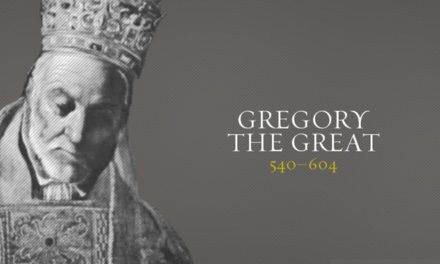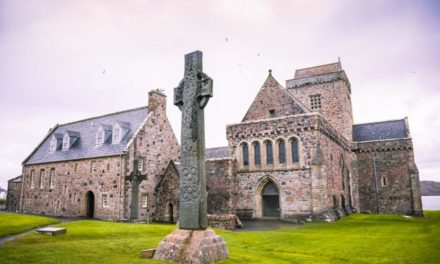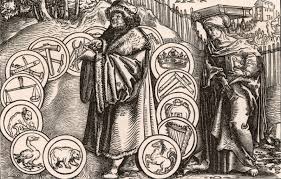This is part 6 of our series titled The First Centuries, in Season 2 of CS. In the last episode we took a look at the Church Father Irenaeus. This episode we’ll consider Tertullian.
That may prompt some to wonder if we’re going to work our way through ALL the church fathers of the Early Church. Uh, no – we won’t. Just a few.
While he’s known to history as Tertullian, his full name was Quintus Septimius Florens Tertullianus.
The story of his origins is a bit confused. Born & raised in the North African city of Carthage, he’s said to be both a Berber, and the son of a Roman centurion in the legion attending the proconsul of Africa. It’s not unheard of that his father could have been BOTH a Berber & legionnaire since by that time Rome conscripted soldiers from many of the people’s they ruled.
Berbers were an African ethnic group who called themselves the Amazigh. The label “Berber” was given them by Greeks, the word is derived from their designation for all non-Greeks from which we get the word “barbarian.” So racially, it’s likely Tertullian was a black African.
Tertullian was born sometime around AD 150 & raised as a pagan. Holding a keen mind, he was given a good education in literature and rhetoric, most likely in preparation for practicing law; a favored profession for young men seeking to enter the political realm in the complex game of Roman social advancement. While the details of his conversion are missing, he came to faith in Christ around the age of 40. Tertullian may have done a brief stint as a lawyer in Rome, but returned to his hometown of Carthage where he lived and worked for the rest of his productive life. While Jerome says Tertullian became a priest, others says he remained a layman, serving the church at Carthage as one of its elders.
As soon as Tertullian converted, he turned his considerable intellectual talents to defending the faith. He was the first to write a systematic set of apologetics and theology in Latin, for which he earned the title Father of Latin Theology.
Tertullian engaged a whole host of topics. He wrote Roman officials explaining in modes they were familiar with why persecution of Christians was unwise. He wrote some of the earliest work on defining the doctrine of the Trinity, using terms later writers drew on to develop the orthodox position of 3 Persons in 1 God. And like Irenaeus before him and form whom he drew inspiration, Tertullian defended the Faith against the Gnostics.
His writing has been described by a slew of interesting adjectives; Aggressive, Sarcastic, Caustic, Harsh, but across it all is a logical brilliance deeply rooted in sacred Scripture. His harshness wasn’t only directed at opponents; he employed it toward himself as well when he shares his own struggles. Though he wrote 2 Cs later, Jerome says Tertullian was well regarded in the Church and a much sought after speaker. If his wriritng is any indication, he understood the imperative of keeping one’s audience alert. It’s clear his learning was vast as he drew form numerous & diverse sources in building his case.
Over 30 of his works are known, though most today are based on ultra-slim manuscript evidence. It’s certain he wrote much more that’s been lost.
His most important work is the Apologeticum, a defense of the Christian Faith & its adherents. Second is his theological treatise titled Against Praxeas, in which Tertullian responds to a heretic named Praxeas who was butchering what the Bible taught about the persons of the Godhead. It was here, for the first time that someone used the term trinity in describing God. In his work, On the Prescription of Heretics, Tertullian lays out a brilliant plan for how to conduct discussions with heretics.
If that’s all Tertullian accomplished he’d still go down as one of the more important of the Church Fathers. But what sets him genuinely apart is that he decided to join a splinter group called the Montanists¸ while at the same time writing prolifically in defense of orthodox Christianity. That alone, and the fact that Tertullian stands as an exemplar advocate of the Faith, move us to re-assess the label attached by some to the Montanists as heretics.
We took a look at the Montanism back in Episode 5 of Season 1. It behooves us to review that.
Sometime around AD 160, 3 people joined forces in Phrygia, a region in central Asia Minor, present day Turkey. A man named Montanus was the leader, but he was assisted by two capable & energetic women named Maximilla & Prisca. They claimed they were directed by the Holy Spirit, via a word of prophecy, to bring much needed reform to the Church.
Most of what’s known about the Montanists comes to us through their opponents and critics. So it’s not always simple knowing what’s an accurate description of their beliefs and what was altered to make them look bad.
Reading modern labels back onto the Montanists, hyper-Pentecostals is an apt description. Montanus claimed that the Holy Spirit spoke direction though him to the Church. He announced that the city of Pepuza in Phrygia would soon be the site of the New Jerusalem and set up his HQs there.
A central message of the Montanists was the soon return of Christ & the need for believers to get ready by adopting a strict asceticism that included much fasting. When they did eat, they were supposed to eat only dry foods, because apparently moist food was too easy to chew & too enjoyable, so it must be a sinful indulgence of the flesh. They were also required to abstain from sex, including married couples. Those who joined the movement were encouraged to relish persecution; regarding it a badge of genuine faith and loyalty to God.
Now, we might assume with such rigorous requirements, the movement wouldn’t be all that appealing and only have a small number of adherents. That’s not the case. It became quite popular. Its appeal was enhanced by a revival of teaching and practice in the use of spiritual gifts. Tongues, prophecy, and other manifestations of the Spirit as described by Paul in 1 Cor 12 were encouraged. And the strict asceticism practiced by Montanists apparently wasn’t merely a way for people to one-up each other in a contest to see who was more spiritually mature & disciplined. It was encouraged by the cherished conviction Jesus was coming soon. A careful watch over one’s moral life seemed a reasonable response to the belief they were about to stand in the presence of a holy God. They needed to pursue practical holiness in their daily lives, because on any one of those days, Jesus could come. Even more, He WOULD come.
The growth & challenge of the Montanist movement presented such a challenge, Church leaders convened some of their first synods to decide how to respond. It was decided the excesses of the New Prophets were too extreme to tolerate. In fact, it was suggested that Montanus’, Maximilla’s and Prisca’s ecstatic prophetic episodes looked more like a case of demons possession than the way the gift of prophecy had been practiced in the Church up tl that time. So exorcists were sent to deal with them. When nothing came of that and the Montanists refused to back down, they were excommunicated. What’s interesting to historians is that while the fact of their excommunication is given, its reason is not. All we know is that an official split occurred between the Montanists and Apostolic Church.
While historically Montanism has gone down as one of the early heresies to threaten the church, the more you read, the more the door opens to question that conclusion. Again, let’s remember most of what we know about them comes from the records of their critics. How would your lifelong opponent describe you? And we have to remember that Tertullian, a rock & pillar of the orthodox, catholic, Apostolic Faith, was a Montanist. So a re-assessment of the Montanists is probably due. This became abundantly clear to me after studying all the various groups that sprang up in Europe during the Middle Ages & Reformation. So many of those little groups History’s plastered with the designation “Heretics” most certainly were NOT! They just refused to abide in what they considered a corrupt and corrupting religious institution. Refusing to kowtow to its demands, they were systematically erased; along with all evidence of their existence, leaving only what their enemies said about them.
So, regarding the Montanists, something I shared in Episode 5 may be helpful à
If you live in an urban or sub-urban community, as you drive around town you see numerous churches with different signs & labels. Christianity is of hundreds of groups and thousands of sects. While the services held in different local churches may be similar, in others they differ widely in style, culture, values, & doctrine. Some services are sedate & composed, putting more emphasis on rationality and the centrality of the sermon or the practice of a liturgy. Others encourage an emotional encounter with God. So the music & worship take a more active place. I’m obviously generalizing widely.
My point is that 2 churches may be packed though each is on the opposite end of the other in regard to the culture they express. Each appeals to a different group of people. It isn’t that one is right & the other is wrong. It’s just that people are different. And God in His wisdom has provided a place for them to come closer to Him.
I can’t help but wonder if there isn’t some of that dynamic that occurred with the Montanists. Before coming to faith in Christ Montanus was a pagan priest of either Apollo or Cybele. Both gods were worshipped by priests & priestesses given to ecstatic trances. Whether these altered states of consciousness were induced by hallucinogenic drugs, extreme meditative rituals, or outright demonic activity – the person in ecstasy would enter a trance where the eyes would roll up into the head, their bodies would go rigid, their voice would alter, & they’d make solemn pronouncements as though by the voice of a god.
That was Montanus’ background. And in light of some of the things he said and did, some have questioned the genuineness of his conversion. Did he really come to faith or like some of the other aberrant groups at this time, did he see the rising popularity of Christianity and simply adopt some of its terms and forms while carrying on under his old practices? Did he just rebrand his demonically-induced ecstasies?
That’s what some church historians conclude. Some of what Montanus, along with Prisca & Maximilla went on to prophecy was goofy. But a good number of the charges leveled against Montanus reflected his practices BEFORE his conversion. It was his critics who accused him of making his post-conversion prophetic announcements in the old pagan trance-like state. Others said that he did NOT operate that way after coming to faith; that he renounced his pagan past. But that he, like his supporters, was someone who yearned for a more emotionally engaged & experiential kind of faith & that the work of the Holy Spirit, so prominent in the earliest church, must not be forfeited. It was in danger of that very thing as the Faith had to contend with hostile government officials and an emerging mix of aberrant groups. All the energy by the church’s brightest leaders seemed to be going into the cerebral, the doctrinal, the apologetic – and this emphasis on the mind was numbing the heart of the Faith. The Montanists wanted to see the Holy Spirit kept active & present in the Church’s midst. Sadly, their claims to being the ESPECIALLY anointed led to excesses, and a discrediting of their movement – just as has happened in more recent times with the wild pronouncements & false prophecies of some of the hyper-charismatics.
Some of the criticisms of the ancient anti-Montanists in fact rested on the fact that the Montanists were so bold in proclaiming their faith and operating in the gifts of the Spirit, it was drawing attention to the Faith right at the time when others were telling believers to keep their heads down & their mouths shut because of persecution.
The decision to excommunicate the Montanists was anything but unanimous among Church leaders. Many believed while the New Prophets had indeed gone too far in their excessive emphasis on asceticism, their renewal of the use of spiritual gifts was a return to the primitive Christianity practiced by the Apostles & described in the Book of Acts.
But what brought Montanism into the greatest disrepute was the failure of some of its leaders’ prophecies about impending events. This and their ultra-strict asceticism earned them the label of being highly aberrant, if not outright heretical.
Though it was right for Church leaders of the late 2nd Century to censure the Montanists for their excesses, they probably went too far in labeling them “heretics.” Because the Montanists put such emphasis on the work of the Holy Spirit, rejecting Montanism tended to put a damper on the exercise of spiritual gifts. An unfortunate turn at a time when Christians needed every bit of help they could get.
As we read Tertullian, it appears he’d grown disillusioned with the moral state of the Church which out of a desire to avoid persecution was accommodating more and more of the ways of the world. Martyrdom, once a badge of honor, was now being avoided even to the place of denying the faith. And Tertullian thought the way the Church was handling serious public sins was way too lenient. Since the Montanists held positions on all these things matching his own, it seemed a natural fit to join them. So join them he did.
What’s not clear is whether that meant Tertullian actually left the church at Carthage to join some local Montanist church. In fact, we’re not even sure there WAS some separate place the Montanists met. It seems most likely they merely existed as a group INSIDE the church at Carthage.
Yet even while numbering himself with the Montanists, Tertullian continued to churn out theology defining and apologetics defending the orthodox, catholic, Apostolic faith. But the anti-Montanists managed to win the day and eventually the sect was declared heretical. So Tertullian was never recognized as a saint. Though his work became foundational to later formulations of the Faith.
Tertullian’s later life remains a mystery. All Jerome has to say 200 years later is that he died of old age.







